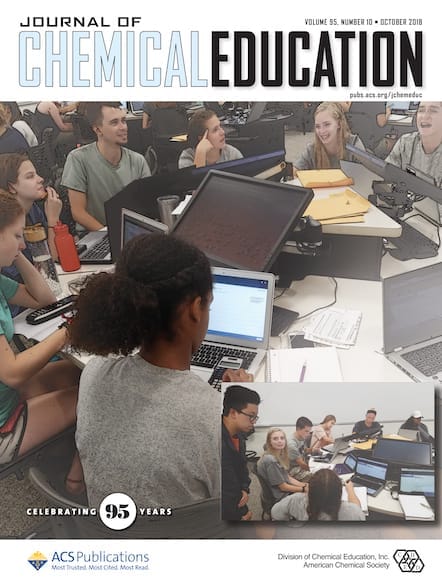This Virtual Special Issue will highlight research and explorations of the scope of climate education in chemistry, oriented by an understanding of the causes, consequences, and impacts of climate change that can drive innovation at all levels of chemistry education. Submit your Manuscript by April 22, 2024.

The Journal of Chemical Education (JCE) announces a call for papers for a forthcoming Virtual Special Issue on the contribution of chemistry education to action for climate empowerment to foreground research and practice in chemistry education that contributes to quality climate education. Quality chemistry education goes beyond knowledge, understanding, and scientific literacy to include emotional, ethical, psychosocial, political, and action education such that chemistry and chemistry education can enable the transition toward a more sustainable society. This is in alignment with the 2030 agenda for sustainable development and associated United Nations Sustainable Development Goals framework.
The Virtual Special Issue will publish reviews and explorations of the scope of climate education in chemistry as well as research and practice oriented by an understanding of the causes, consequences, and impacts of climate change that can drive innovation at all levels of chemistry education.
Contributions are invited in the following areas:
- Reviews of action for climate empowerment through chemistry education.
- Articles or communications which examine chemistry education for climate action, for example, developing concepts such as climate justice or post-truth, in the chemistry education context.
- Relevant demonstrations, laboratory experiments, models, interactive tools, simulations, activities, and technological innovations that support curriculum planning and teaching of climate change in chemistry.
- Examples of industrial applications of green chemistry principles for climate change mitigation including case studies.
- Methodological approaches to climate change education research which draw on cognitive, psycho-social, political, and action outcomes contributing to climate empowerment.
- Theoretical perspectives on education relating to the nature of chemistry and chemical knowledge creation in connection with climate change.
- Empirical studies, for example, evaluations of effective innovative practice in the teaching of climate change in chemistry, either discipline-based or interdisciplinary approaches such as Planetary Boundaries where chemistry plays a central role, in educational settings.
- Commentary consisting of a scholarly discussion and opinion on the contribution of chemistry education to action for climate empowerment. Commentary should contain sufficient information for readers to understand the topic and formulate their own opinions.
Articles should:
- Focus on teaching and learning chemistry, including but not limited to pedagogy, laboratory learning, conceptual change, assessment, achievement, field studies, technologies (broadly defined), and curriculum development.
- Communicate novel, high quality, and discipline-specific research on the contribution of chemistry education to action for climate empowerment.
- Include questions or hypotheses applicable to chemistry education and present theoretically or conceptually framed research relating to both education and chemistry.
- Add to knowledge about the role of chemistry education in responding to the climate crisis and identify implications of knowledge for practice.
To learn more about the scope and requirements for this Virtual Special Issue, read the accompanying Editorial.
Organizing Editors
This Virtual Special issue will be managed by:
Glenn Hurst, Ph.D., Associate Editor, Journal of Chemical Education
Dr. Hurst is Senior Lecturer (Associate Professor) of Chemistry Education in the Department of Chemistry at the University of York. His research interests lie within chemistry education, specializing in adopting systems-thinking approaches within all levels of green and sustainable chemistry education, which forms part of his work in the Green Chemistry Centre of Excellence.
Lynda Dunlop, Ph.D., Guest Editor
Dr. Dunlop is Senior Lecturer in Science Education at the University of York and Director of Education for Environmental Sustainability at York (ESAY). Her research focuses on climate and environmental sustainability education, interdisciplinary approaches to education and youth participation in environmental decision-making.
Denise Quiroz-Martinez, Ph.D., Guest Editor
Dr. Quiroz-Martinez is Lecturer in Science Education and Education for Sustainability and Director of Bachelor Programme of Pedagogy in Biology and Chemistry at Faculty of Education Sciences, Universidad de Talca, Campus Linares, Chile. Her research focuses on education for sustainability, science education and teacher initial and professional development.
Jane E. Wissinger, Ph.D., Guest Editor
Dr. Wissinger is Professor and Organic Chemistry Laboratory Director Emeritus at the University of Minnesota in the Department of Chemistry. Her research focuses on the development of curriculum materials that exemplify modern green chemistry methodology, advances in sustainable polymers, and guided-inquiry pedagogy, as well as promote systems thinking and the UN Sustainable Development Goals.
Submission Information
We welcome submissions for this Virtual Special Issue through April 22, 2024.
Manuscripts should align with the principles outlined in the Author Guidelines for the Journal of Chemical Education (Author Guidelines) and can be submitted using these manuscript types: Activity, Article, Chemical Education Research, Commentary, Communication, Demonstration, Laboratory Experiment, and Technology Report. Authors are strongly encouraged to use the JCE-specific manuscript template which contains prompts for required manuscript components; using the manuscript template aids in creating documents that are easier to review and publish.
How to Submit
- Log in to the ACS Paragon Plus submission site.
- Choose the Journal of Chemical Education.
- When submitting your manuscript in the Paragon system, select “Action for Climate Empowerment in Chemistry Education” under the Special Issue Selection during “Step 1: Type, Title, & Abstract”.
Questions about the suitability of a manuscript topic can be directed to Lynda Dunlop at lynda.dunlop@york.ac.uk. If you have any general questions regarding submission to this Virtual Special Issue, please contact (eic@jce.acs.org).
